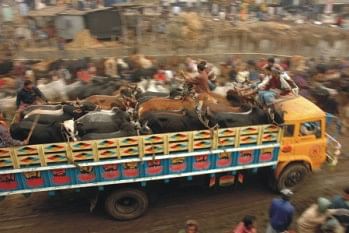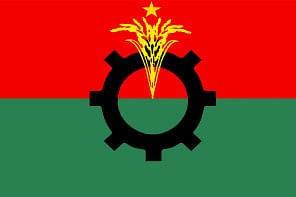Eid, Korbani, Sidr and what needs to be done

Photo: Munir uz Zaman / drik news
The Eid-ul-Azha this year is like no other Eid we have celebrated before. We are enveloped by an ominous cloud of human tragedy unleashed by Cyclone Sidr last month that left little or nothing standing in its path in the south-southwest of Bangladesh.
More than 5 million people were left homeless, asset-less, and with virtually nothing to look forward to. In the backdrop of such devastation Eid and korbani this year will have special significance. With less than a week to go for Eid, we usually prepare for sacrificing one or more animals, buy expensive clothes and gifts, and organise elaborate festivities.
The measure of our joy is often equated with the number and size of our sacrificial animals and the extravagance of our preparation. There is something wrong with entertaining this mind-set even in the best of times, but in the wake of last month's unprecedented tragedy, there is everything wrong with this approach.
Religious view
I was fortunate to be able to interact with the khatib of Baitul Mukarram mosque and a few other religious leaders last week on this subject. In their view korbani means only sacrifice, and has no relationship with any extravagance.
Korbani is wajib (almost binding) for any person who is able to pay zakat. Such persons, no doubt, should fulfill their obligation to give korbani. However, giving korbani in the name of others is only nafal (not binding, but gives sowab) and sacrificing more animals does not enhance our sowab.
Lavish expenditure during Eid is best avoided. Other than the wajib korbani the rest of the festivities and nafal korbani can be substituted by donating the savings so made to the Sidr victims.
In my opinion, there can be no more pious deed than saving lives. We can help save the lives of many Sidr victims if we curtail some of our expenditures on nafal korbani and grand celebrations and donate those savings. I believe Islam encourages us to do so.
Social and economic impact
The transfer of funds to Sidr victims by drastically reducing the number of korbani will not be a seamless costless transaction. It is very likely to have serious economic and social repercussions, some of which can have long-term consequences. A socio-economic impact analysis identifying the losers, quantum of loss, and tenure of impact is necessary.
Orphanages, madrassas, mosques, and welfare institutions
Last year we sacrificed 20-22 lakh large animals (cows and buffaloes) during Eid. The skins of those animals were almost entirely donated to these institutions. They sold these skins at the average rate of Tk 2,500 per piece and for 20 lakh pieces earned an estimated amount of Tk 500 crores. This constituted the lion's share of their income. If this year the number of korbani falls drastically then they will have no preparation for alternative sources of income. As a result lakhs of orphans may become homeless without any Sidr, thousands of madrassas may have to close down, and a large number of religious-denominated welfare activities may come to a grinding halt.
Leather, industry and exports
Last year the leather industry processed 56 lakh pieces of skin of which 40 percent were procured through korbani. The industry has investments of thousands of crores and employs lakhs of people. Our leather and leather products exports amounted to Tk 2,800 crores last year, and there is a projected growth of 20 percent for this year. So, if the number of korbani falls dramatically this year, it will not be possible to collect enough skins to keep the industry running. As a result the huge investments, employment, and exports will all be at serious risk. This will have long-term consequences for our economy.
Action needed
In the present context it is the moral responsibility of every citizen to do whatever we can to help our mothers, fathers, brothers, sisters, sons and daughters who have been so cruelly victimised by Sidr. We have an opportunity this Eid to achieve savings by reducing korbani and extravagant expenditure and transferring these savings to the Sidr victims. On the other hand, the socio-economic impact analysis tells us that it is not possible to affect this transfer in a seamless, costless manner but rather that there are serious potential risks.
While the right thing to do would be to transfer savings from Eid to the Sidr victims we must ensure that careful balance is maintained to avoid the accompanying risks of disruption. Under the circumstances we need to:
- Embrace restraint in our celebrations and expenditures.
- Reduce the number of korbani, restricting them to only those that are wajib and spend less on the animals and on showmanship associated with it.
- Transfer savings so made to the Sidr victims.
As a result of the above actions, I believe the number of korbani will reduce by 10-20 percent, i.e. approximately 2-4 lakh fewer cows will be sacrificed. If savings per cow is Tk 12,500 we can transfer Tk 250-500 crores. On the other hand orphanages and madrassas may receive Tk 50-100 crores less but hopefully they will be able to endure this. The leather industry will also no doubt suffer, but it will survive. I believe this will ensure a win-win solution, beneficial and acceptable to everyone.
M. A. Rouf Chowdhury is Member, Regulatory Reforms Commission, and ex-Director, FBCCI.

 For all latest news, follow The Daily Star's Google News channel.
For all latest news, follow The Daily Star's Google News channel. 



Comments